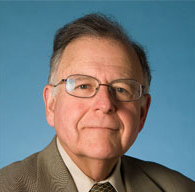Dr. Martin Wachs, who passed away Sunday evening, was California’s preeminent transportation scholar. He knew both Northern and Southern California well, having joined UCLA’s urban planning department in 1971 and founded its Institute of Transportation Studies, while also spending a decade at UC Berkeley in the interim, where he chaired that’s schools transportation studies program. Much of our knowledge about the history of the state’s transportation system and our ability to evaluate its efficacy comes from his prolific scholarship and role as a public commenter on major transportation decisions.
But more than that, he was a humble and generous person with boundless curiosity and intellect. I first met him when I was researching the history of the Los Angeles Metro Rail system, back in 2007. His influence on Los Angeles transit debates was all over the archival and media documents I found from the 1970s and 1980s, from his scholarship to his op-eds to his conference appearances. Los Angeles elected leaders took his research seriously, even if they didn’t like his skepticism about rail transit in a city as spread out as Los Angeles.
I had originally approached the book as a rail enthusiast, and when I met him in his then-RAND office a few blocks from my Santa Monica apartment, he seemed aghast that I would set out to write a book that would promote rail. But he nonetheless provided me with contact information for a former student who had researched Metro Rail history, along with a few large binders of research for my files. I thanked him profusely and relied on his research for much of the discussion in the book on L.A.’s rail history. In fact, much of what we know about the demise of the Pacific Electric streetcar system in Southern California and its myth-busting conclusion that it was not a car company conspiracy is due to his groundbreaking research.
When my book Railtown was finally published seven years later in 2014, Marty was invited to co-present with me on its findings at an event at UC Berkeley. Top faculty at the school lined up to greet him, like fans seeking autographs at a celebrity book signing. It was an impressive indication of his impact and role as a longtime mentor and generous colleague to so many of them. He was like a returning rock star in his field.
While I was a bit worried how he would react to the book, his comments that evening were thoughtful and ultimately complimentary. I chronicled them at the time on this blog. They are worth reading for anyone interested in his take on rail. What stood out to me was his comment that the book showed him how little politicians actually heeded the advice of transportation scholars, as they forged a path for rail investments despite the caution of experts. And as a recent member of the high speed rail peer advisory group, he was finding a similar dynamic at play, with politicians making short-sighted decisions on this crucial California infrastructure project that have come back to haunt and potentially torpedo its progress.
After that evening in 2014, we kept in touch, even co-authoring an article series on the pros and cons of rail transit investments. If I ever had any questions or needed advice or resources, Marty would jump at the chance, providing thoughtful responses, lists of resources to review, and people to contact. Hundreds of others could say the same thing — his legions of former students now working on urban planning issues, his colleagues, and countless leaders and readers who have benefited from his scholarship and thinking on these complicated issues. You can read some of their tributes (and find out how to honor his memory) on this UCLA website.
Just a few months ago I contacted him about a new rail transit study we’re conducting at UC Berkeley Law. Typical Marty, he immediately offered to schedule a Zoom with our team, providing invaluable advice. But what I remember now is his initial email back to me, where he reflected on his life during the pandemic times. Like most of us, he was home-bound, and he missed his children and grandkids. But he was enjoying his work (including a manuscript in progress that I hope will be finished somehow) and took solace in his garden.
I pictured him in the warm Southern California sun tending to his plants and wonder now who will care for them with his absence? It’s just a small example of the giant hole his death leaves in our world. But Marty’s amazing legacy — beyond the scholarship and influence on public debates — includes his many former students, colleagues, and friends. He trained and supported so many well, who can do their best now to carry on the work he advanced, on issues that affect so many people’s daily lives.
Rest in peace, Marty, and thank you.



